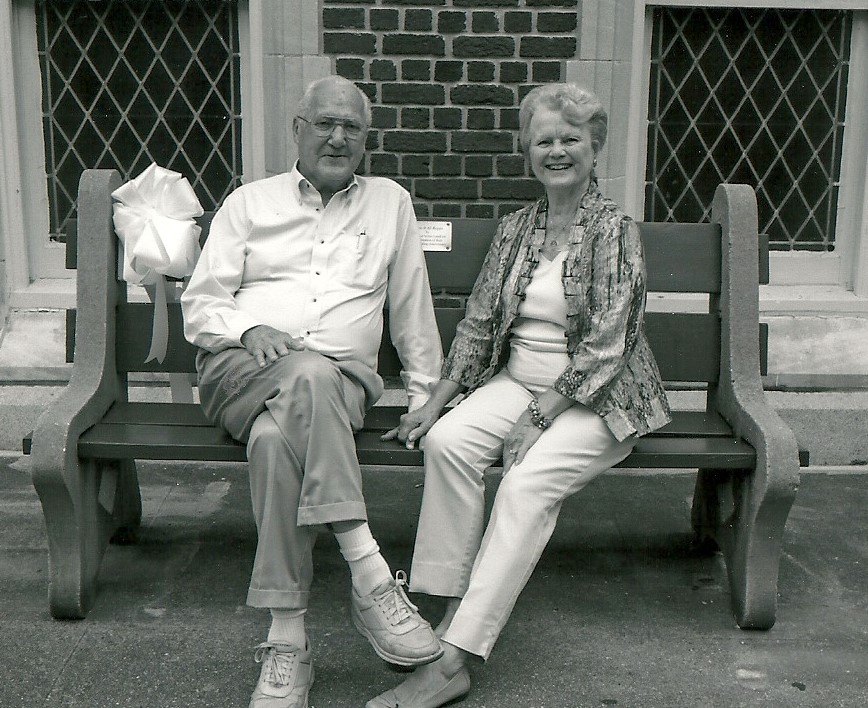Loyola remembers Moon Landrieu
The Landrieu Family/David Spielman
Moon Landrieu and his wife, Verna Landrieu, sit on their dedicated bench at Loyola University New Orleans.
September 22, 2022
Moon Landrieu, a Loyola graduate and the 56th mayor of the City of New Orleans, died on Sept. 5 at the age of 92.
Landrieu was a powerhouse of civil rights advocacy during his time as mayor, and was among the few politicians who spoke out against racial segregation in the 1960s and 1970s.
Madeleine Landrieu, dean of Loyola University New Orleans College of Law and Landrieu’s daughter, said that her father wasn’t exposed much to the racial inequities that took place in New Orleans growing up, but it was at Loyola that his worldview began to change.
“Loyola helped my dad dispel all of those myths he had been taught as a child,” Madeleine Landrieu said. “It was here at Loyola that he coveted those relationships, and it just compelled him to go into public office and make a difference in the world.”
Despite harsh criticism for his beliefs, Landrieu campaigned tirelessly for racial integration of government and public facilities and was committed to racial equity, even if it meant losing the votes of his White constituents.
“My dad was almost unflinching,” said Mary Landrieu, Moon Landrieu’s daughter and former United States senator. “He never allowed the criticism to get under his skin. He had this confidence that what he was doing was right.”
Moon’s Time at Loyola
It was in law school at Loyola that Landrieu met Norman C. Francis, Loyola’s first Black graduate, and it was also the first time he’d been in a social setting with a person of color, according to Madeleine Landrieu. Landrieu and Francis remained close friends from the time they met until Landrieu passed away.
Moon and his wife, Verna Landrieu, first met at Loyola, and were very active in the campus community. Together they attended student council meetings, where Moon was elected student body president as an undergraduate.
“He and mom were in every club there was, they felt very connected to the community. All of their friends were Loyola graduates.” Madeleine Landrieu said.
Mitchell Crusto, a Loyola law professor, said that Moon Landrieu was a real life example of Jesuit principles in action, and left a lasting stamp of goodwill on the city, state, and nation.
“He was an example of a life well-lived, pursuant to the Jesuit ideals of living for others. He was a selfless servant of the people, a model family man whose children reflect his commitment to service above personal needs.” Cristo said.
Moon’s fight for justice
Madeleine Landrieu said that her father had numerous Black men and women advise him throughout his campaign because he wanted to ensure that he was listening to those who would be most affected by his efforts.
“If standing up for what he believed in meant that he wasn’t going to win his next election, it was a price he was willing to pay,” said Madeleine Landrieu.
Landrieu was elected with 99% of Black votes and paved the way for a long series of Black mayors. This line of Black mayors ended in 2010 with Moon’s son, Mitch Landrieu, who is now senior advisor to the President of the United States.
Moon was committed to providing the Black community in New Orleans with possibilities to attain political power, and he kept his promise in his mayoral debate in 1969 that he would appoint Black people to positions in City Hall.
Landrieu began fulfilling his promise almost immediately, appointing Reverend A. L. Davis as the city’s first Black councilor, as well as his first Black assistant, Robert H. Tucker Jr.
By the end of Landrieu’s tenure as mayor, the percentage of Black city employees had risen from 19% to 43%.
Moon’s Legacy
As his children grew up, Landrieu had them attend his political and public events. Both Mary and Madeleine Landrieu said it was very clear to them that their father’s work didn’t grant them privileges but rather responsibilities.
“He wasn’t the kind of father who would try to shield us from the problems in our community,” Mary said, “He always opened our eyes to the needs and the challenges of others.”
Madeleine said that Landrieu always compelled his children to do the right thing, even if it was hard. Among the nine children, three have gone on to become political figures.
Mary Landrieu said that her father inspired her in every way, and that she could observe from an early age how people listened to and valued his views and opinions.
Madeleine added that she and her siblings grew up surrounded by Jesuit values and that her parents were centered on family and Catholic faith. She said the family attended Sunday mass at the university’s Ignatius Chapel.
“He was not a perfect man, but I have honestly not known any man to try harder to be better every single day,” Mary said, “It was like a competition he had with himself to be the best he could be. He never quit on himself.”








